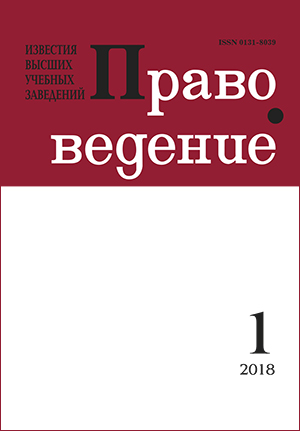Power relations and its subjects in the states of democracy: conceptual generalizations of domestic theory
DOI:
https://doi.org/10.21638/11701/spbu25.2018.104Abstract
This article updates on theoretical level a number of issues concerning the analysis of the democracy states in which it proposes to single it out as a special type, people’s state — an independent political and law construction having its own individual features, and it should be analyzed beyond traditional fitting with the only form of state. State system of this type can be revealed in different forms, united by the principle of public and law solidarism, the unity of public power and society on theological and axiological grounds and law and order. The source of this form of social and legal communication is heterogeneous people, but with inner cohesion. The article forms notions about the subjects of public power in the states of democracy, opens up the peculiar features of social and legal communications between them (power relations), in which the state and its public power is the continuation of supreme power of sovereign people. The notions of supreme and superpower of the state are differentiated in the article, some elements of representation people and social and political self-organization of the citizens are considered, the issue of search of grounds for the unity of public power, consolidation of ties with the people in contrast to classic construction of “dividing powers”. The accent was made that political struggle and interparty confrontation in the system of democracy must fit the frames defined by the power of public solidarism. It is proposed to revive the discussion about the peculiarities of realization of democracy principle declared in the Constitution of Russia in the frames of state and domestic law theory.
Keywords:
power relations, subject of power relations, people, democracy, sovereignty of the people, people’s state, state power
Downloads
References
Downloads
Published
How to Cite
Issue
Section
License
Articles of "Pravovedenie" are open access distributed under the terms of the License Agreement with Saint Petersburg State University, which permits to the authors unrestricted distribution and self-archiving free of charge.




